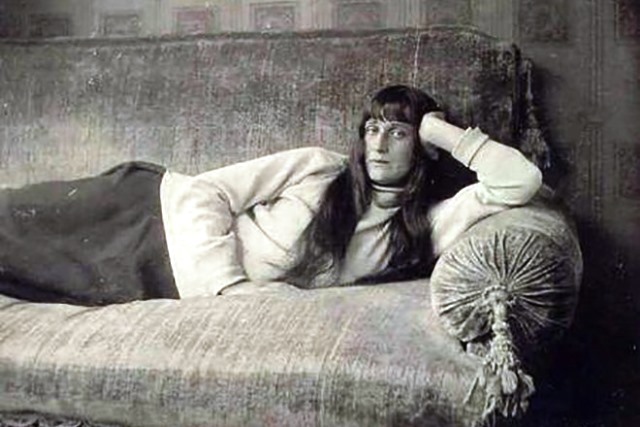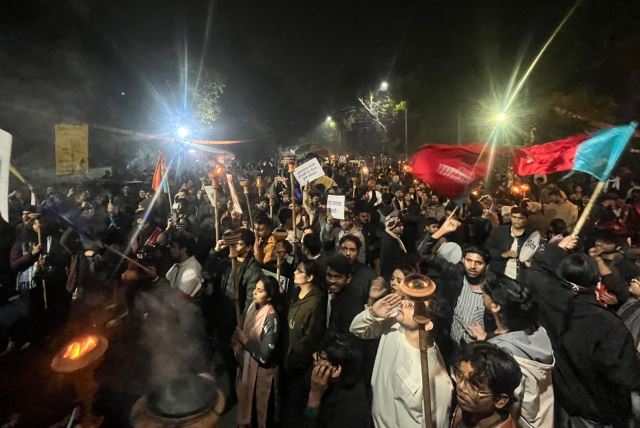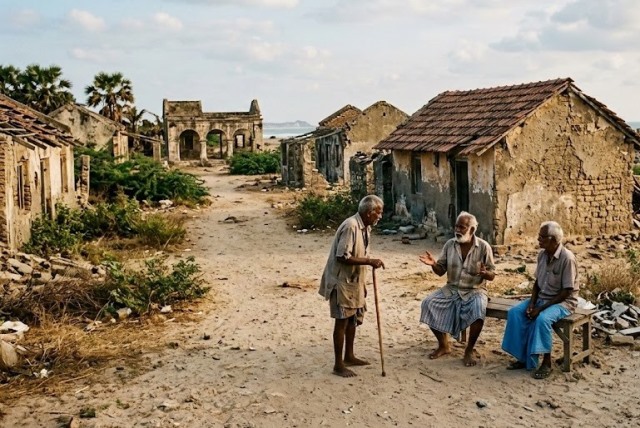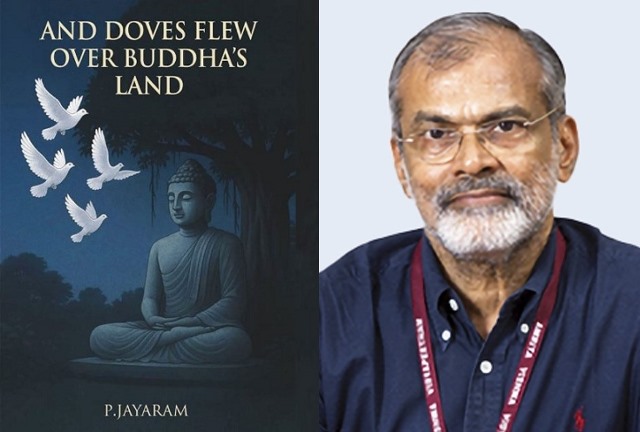
This Winter, The Birds Are Not Singing
No foreign sky protected me,
no stranger’s wing shielded my face.
I stand as witness to the common lot,
survivor of that time, that place…
The stars of death stood over us. And Russia, guiltless, beloved, writhed under the crunch of blood-stained boots, under the wheels of Black Marias
– Anna Akhmatova, Requiem. (Black Marias: The police vans which took away people.)
Winter has arrived this year like the sadistic summer of 2025: a winter of discontent. Like a bad faith foreboding of a fake nuclear winter, always in the making, the heartless shadow of evil walking the front and back pages of newspapers/TV screens, hanging low for all to see, with a foul smell, sick, distasteful, nauseating. This winter has arrived with a sinister sensation between my eyelids, a lurking nightmare in the next lane, a sleep-walking ghost who walks in the deathly post-midnight corridor.
The only relief is the familiar fragrance and the drifting of tobacco smoke, the table lamp flickering in the dark, a half-burnt cigarette in the ash tray. A book in hand, with its yellow pages smelling of wood, leaves and bark. A flower between the pages. A glass of unfinished whiskey, with one cube of ice.
There is a nip in the polluted air, a sickly chill. Oh, it is so familiar, after tonnes of poison has been wilfully unleashed on our senses, with the fake sound of bombs masquerading as crackers; oh, what joy it brings to the rich who blow up their money in smoke, the sound, non-stop, ceaseless, like a jarring orchestra inside our eardrums, plugged in.
Guns and flowers. The nectar of poison. The slow poison of solitary confinement. There is no way out.
Every year, in the capital of India, the auspicious festival of lights, in the season of festivals, is a divine redemption.
The victory of good over evil.
Good or evil, you are condemned either way.
The sickly winter nip in the air arrives not as a pleasant anticipation, which would rekindle lovely remnants of nostalgia, forgotten traces of buried memories, smells, touch, feelings, sense and sensuality, hand-written postcards used as bookmarks, comic books, camphor inside old trunks with hand-made sweaters and socks, painstakingly stitched, minute after minute, with deft, untiring fingers – the mother’s love for an unborn baby, the beloved’s love for a young lover, the sister’s love for a sister.
I still wear the dark purple sweater – she made it when I was in JNU. My hardworking and frail mother. Dark and warm, in coarse, softened wool. Her entire life of love and giving enclosed inside its every pore and knit.
But this winter is different, and its arrival is replete with bad omen and terrible forebodings. I can sense it inside my intestines, between my fingers, between the eyelashes, inside my old cotton shirt, in the diary with my jottings, in every book I pick up to read, and every note of Vivaldi’s Four Seasons I hear – and not only the lyrical, musical chapter on winter, slow, solitary, sad, static, cold, frozen, uncanny, almost warning of another imminent tragedy. Chronicle of a tale foretold.
A suppressed cry of deep angst. A scream of unexpressed despair. No. Not like that Edvard Munch painting. This is different.
In this winter of discontent, there is neither autumn nor spring, Vivaldi’s violin breaks into the bitter realism of our times. The kaleidoscopic colours of falling leaves are not from The Fall, spring no long reminds of mountain streams gurgling amidst pristine rocks, sculpted by the gushing waters, and the pink, vermillion, blue, yellow wild flowers, swimming in the gurgle of the waters. You don’t remember those Pablo Neruda lines anymore: I touch you, and you ripple, like a river…
The sky is poisoned, overcast, darkened in an artificial cover of clouds which are not clouds, the daylight sun has neither daylight nor sunshine, and the birds, which had choked in the onslaught of the Diwali smoke, trapped by the crackers and the fake bombs, and the street dogs, who had lost their voice, are slowly trying to get back. Even the crows, who wake up earlier than the early morning melody queen, the koel, perched on the tall saptaparini tree in my balcony, have fallen silent.
The koel was my morning alarm clock. The koel has stopped singing.
The stars don’t twinkle anymore. The sun does not shine anymore. The wind reminds of death.

I think of Anna Akhmatova, the great Russian poet, already condemned by the dictator, in the freezing cold of Russia. I think of her standing for hours waiting for a loaf of bread in Leningrad, amidst women, who had faces, but you can’t see their faces anymore. They don’t speak anymore. They whisper. Everyone only whispers these days.
In the poem, Requiem, she writes, while waiting for her son, Lev, imprisoned in Stalin purges, for ‘counter-revolutionary’ activities:
“Instead of a Preface: In the terrible years of the Yezhov terror I spent seventeen months waiting in line outside the prison in Leningrad. One day somebody in the crowd identified me. Standing behind me was a woman, with lips blue from the cold, who had, of course, never heard me called by name before. Now she started out of the torpor common to us all and asked me in a whisper (everyone whispered there):
“Can you describe this?” –
And I said: “I can.”
Then something like a smile passed fleetingly over what had once been her face.”
Since the hyperbole of the Trump ceasefire, not one day has gone by when Israel has not bombed Gaza. It has been relentless. On Thursday, the Israelis targeted, as usual, civilians, shelters, refugee tents, hospitals, schools, while blaming its mythical allegations on Hamas.
More than 100 ordinary people were killed, including, yes, 40 children. As many as 270 were seriously injured, including 70 children. Kids and young women, the main targets of Israel. That is how they have operated since October 7, 2023. Kill the women, the young mothers, the little ones, even the ones just born. Trump has endorsed the killings.
Israel “should hit back” when attacked, he said. “They killed an Israeli soldier. So, the Israelis hit back, and they should hit back. When that happens they should hit.”
Pictures of the faces of the little boys and girls are on social media – smiling faces. Now they will never smile anymore.
(The unconfirmed story goes that one Israeli soldier was killed in the Rafah border by unknown men. Reports say that Hamas is not involved; it has denied involvement in any violence since the ceasefire, negotiated in Egypt with Qatar and other Arab countries, including UK, as mediators. It has been reported that the unknown, underground group which killed the Israeli soldier did not apparently know that a ceasefire is in place.)
Meanwhile, an Al Jazeera and Hind Rijab Foundation (HRF) investigation has disclosed the names of 24 soldiers, including their commanders, who pumped 335 bullets in the ravaged car surrounded by armoured vehicles, where six-year-old Hind Rijab, trapped with the dead bodies of her relatives, was murdered. One of the commanders reportedly has American links.
The foundation has taken the issue to the International Criminal Court in Hague with a 120-page report, with all the evidence. In its report it states: The submission builds on HRF’s first communication of 3 May, 2025, and provides detailed evidence identifying the Vampire Empire Company of the 52nd Armoured Battalion (“Ha-Bok’im / The Breachers”), operating under Israel’s 401st Armoured Brigade.
The complaint names: Colonel Beni Aharon, Commander of the 401st Armoured Brigade. Lieutenant Colonel Daniel Ella, Commander of the 52nd Armoured Battalion. Major Sean Glass, Commander of the Vampire Empire Company, along with 22 identified tank crew members of the same company who directly participated in or facilitated the attack.
That is, Nuremberg might be in the past. But, as we know, history can repeat itself. No murderer or mass murderer, can escape forever.
These ‘brave’ commanders and soldiers, in a long phase of ‘self-defence’, killed, first the paramedics of Red Crescent who reached the car to help the little girl, then pumped all their bullets inside her little body.
And what was Hind Rijab, the little girl, asking the woman on the helpline, again and again:
“Will you come and get me? I am so scared?”
In the depth of winter, I finally learned that within me there lay an invincible summer. — Albert Camus
A very different ugly and deadly winter! Simply unimaginable crimes well-described. No any human of any conscience can such tolerate (US-Trump) and commit such crimes. All humanity, morality, theories, principles, laws and international institutions made totally collapsed! It can now happen anywhere at any time by such permanent war criminals to save their race and greed. We must find a way to resist.
Winter of discontent has further engulfed the green city.. your images rake memories of a bygone era..nostalgia crawls in .. soon i will be listening..lo phir basant aayee ..in an springless ambience …and mother’s memory ..sweater..reminds Guru dutt’ sweater in kagaz ke phool .. not much to expect in this Grave new world all around .. Death of a dream..ye wo sahar to nahin..



